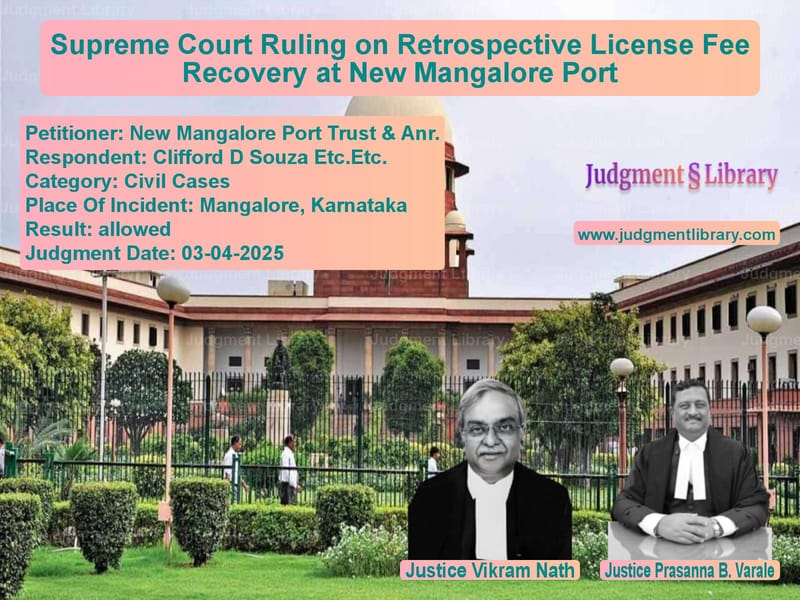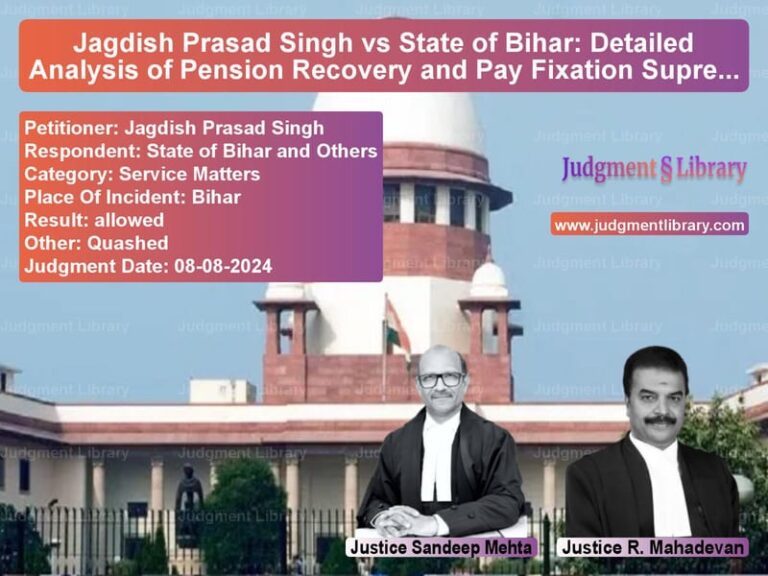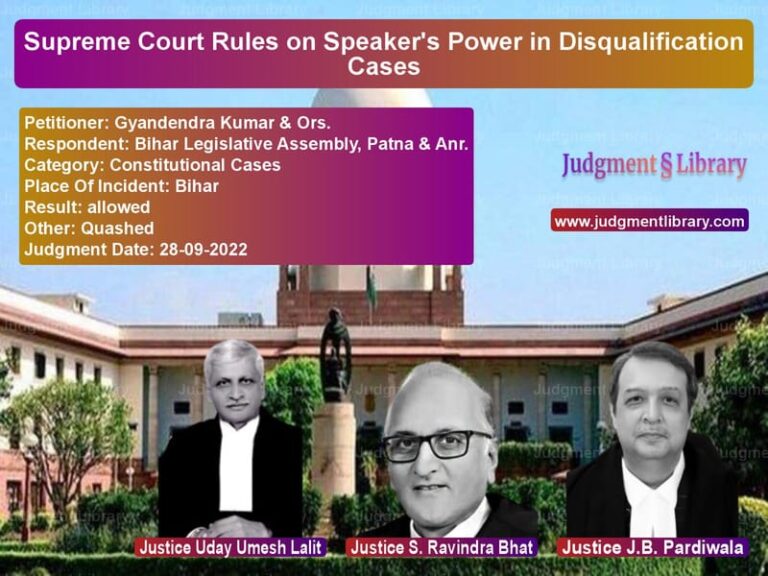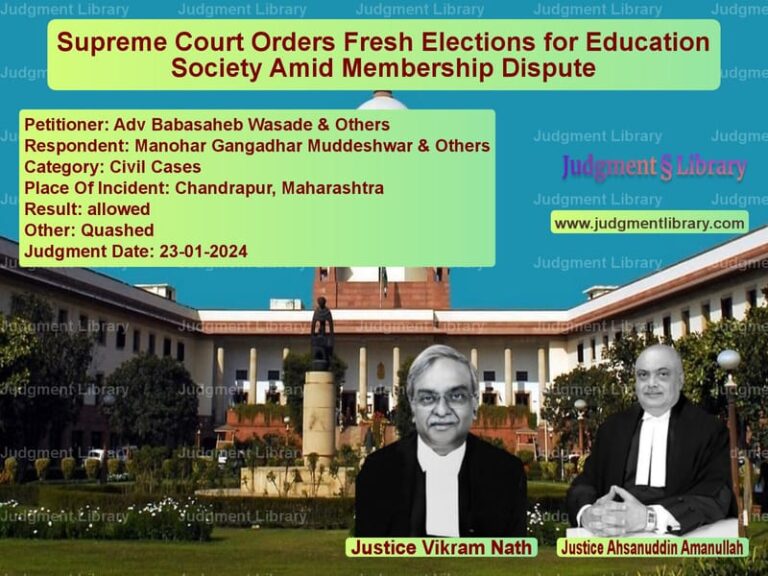Supreme Court Ruling on Retrospective License Fee Recovery at New Mangalore Port
The Supreme Court of India recently delivered a significant judgment in the case between New Mangalore Port Trust (NMPT) and Clifford D’Souza & Others, concerning the recovery of retrospectively revised license fees. The case involved complex legal questions about limitation periods, acknowledgment of debt, and the proper procedure for recovering dues under the Public Premises (Eviction of Unauthorised Occupants) Act, 1971.
Case Background
The dispute originated when NMPT revised license fees for land allotted to various licensees for loading and unloading goods. The key timeline of events includes:
- 2003: Initial land allotment to licensees
- 2005: First license fee revision effective from February 2002
- 2010: Second revision notified on 23.07.2010, effective from 20.02.2007
- 2011-2012: Licensees challenged the retrospective revision in Karnataka High Court
- 2013: Single Judge dismissed petitions, upholding retrospective revision
- 2015-2016: NMPT issued demand notices under PP Act
- 2017: District Judge allowed appeals by licensees, quashing demands
- 2019: High Court upheld District Judge’s order
Key Legal Issues
- Whether recovery proceedings were barred by limitation
- Applicability of Section 18 of Limitation Act regarding acknowledgment of debt
- Proper procedure for recovery under Public Premises Act
- Effect of pending appeals on recovery proceedings
Appellant’s Arguments (NMPT)
“The licensees did not raise the plea of limitation in their reply to the show cause notice under Section 7(3) of the PP Act. For the first time they raised it in the appeal. Under the PP Act no limitation is prescribed for passing an order under Section 7(1).”
“The judgment in the case of NDMC vs. Kalu Ram, although wrongly decided holding that there would be limitation of three years applicable to recovery proceedings under the PP Act, but without going into that question in view of the facts of the present case, the proceedings for recovery under the PP Act were within the limitation period of three years.”
“The respondents were well aware that they had lost from the Single Judge as their petitions had been dismissed but still, they had been resisting the demand only on the basis of the pendency of the appeals before the Division Bench.”
Respondents’ Arguments (Licensees)
“The appellant, having failed to raise the plea of acknowledgment and extension of limitation under Section 18 of the Limitation Act either before the Estate Officer, the District Judge or the High Court and not even in the pleadings before this Court, cannot raise this plea during the course of oral arguments.”
“The communication dated 04.02.2015 never admitted the liability/debt. In fact, it clearly denied the liability/demand on the ground that there could be no retrospective revision of tariff.”
“The demands raised prior to 12.08.2015 were not under any statutory provision. These demands were being raised by the lessor to the lessee.”
Court’s Analysis and Decision
The Supreme Court made several important observations:
On Limitation Period
“Section 18 of the Limitation Act is very clear that where liability is acknowledged in respect of any property or right, a fresh limitation may be computed from the time when the acknowledgment was so signed.”
“The respondents were throughout alleging that the time had not been come as the appeals were pending before the Division Bench. This acknowledgement was given in response to the demand by the lessor (appellant) made well within the limitation of 3 years.”
On Pending Appeals
“Once the issue relating to retrospective applicability of revised tariff has been upheld by the learned Single Judge and the writ petitions filed by the respondents were dismissed, against which intra-court appeals at the instance of the respondents were pending, the High Court ought not to have proceeded with the hearing of the writ petition.”
On Technical Objections
“The respondents therefore ought not to have benefitted out of the technical objection raised by them regarding the limitations when they were themselves bound by the decision of the learned Single Judge and had no other objection or denial to the demand except that of the pending appeals before the Division Bench.”
Final Judgment
The Supreme Court:
- Allowed the appeals and set aside the High Court’s order
- Restored the writ petitions to be heard after disposal of pending intra-court appeals
- Directed that if appeals are allowed, no recovery would be made
- If appeals are dismissed, licensees would be liable to pay with interest
Significance of the Judgment
This ruling has important implications for:
- Port authorities and their license fee recovery mechanisms
- Interpretation of limitation periods in recovery proceedings
- Treatment of pending appeals in recovery matters
- Application of Public Premises Act provisions
The judgment balances the rights of port trusts to recover legitimate dues with protections against arbitrary retrospective revisions, while emphasizing that technical objections shouldn’t override substantive justice.
Petitioner Name: New Mangalore Port Trust & Anr..Respondent Name: Clifford D Souza Etc.Etc..Judgment By: Justice Vikram Nath, Justice Prasanna B. Varale.Place Of Incident: Mangalore, Karnataka.Judgment Date: 03-04-2025.
Don’t miss out on the full details! Download the complete judgment in PDF format below and gain valuable insights instantly!
Download Judgment: new-mangalore-port-t-vs-clifford-d-souza-etc-supreme-court-of-india-judgment-dated-03-04-2025.pdf
Directly Download Judgment: Directly download this Judgment
See all petitions in Property Disputes
See all petitions in Lease Agreements
See all petitions in Debt Recovery
See all petitions in Judgment by Vikram Nath
See all petitions in Judgment by Prasanna Bhalachandra Varale
See all petitions in allowed
See all petitions in supreme court of India judgments April 2025
See all petitions in 2025 judgments
See all posts in Civil Cases Category
See all allowed petitions in Civil Cases Category
See all Dismissed petitions in Civil Cases Category
See all partially allowed petitions in Civil Cases Category







